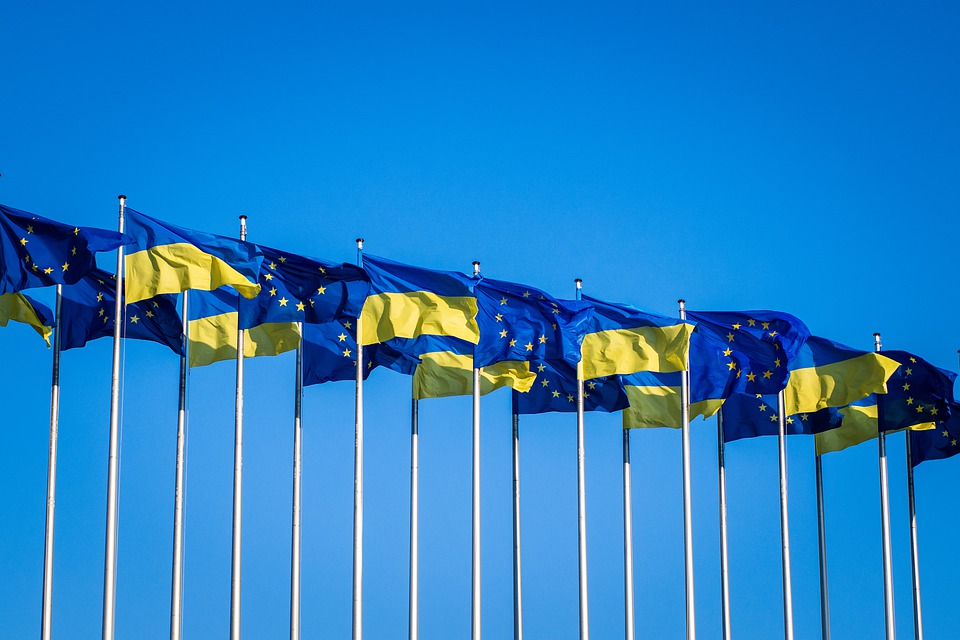The European Union’s executive branch announced that the bloc has given its final approval on a new set of sanctions to impose on Russia over the war. The new sanctions follow the nuclear threats levied by Moscow as well as the order of partial mobilization and the claims of annexation.
The European Commission said Wednesday that the bloc has given its final approval on a new set of sanctions on Russia over the war. The bloc took action following the Kremlin’s nuclear threats as well as Vladimir Putin’s order for Russian reserve troops to partially mobilize, and Putin’s claim to annex four territories of Ukraine.
“I welcome the member states’ agreement today on the eighth sanctions package,” said European Commission President Ursula von der Leyen. “We will never accept Putin’s sham referenda nor any kind of annexation in Ukraine. We are determined to continue making the Kremlin pay.”
The new sanctions include additional restrictions on trade with Russia on steel and tech products as well as an oil price cap for Russian seaborne crude deliveries to third countries through European insurers that are meant to align the EU with the United States.
The new sanctions will also target more individuals in the Russian defense ministry and individuals that are involved in Russia’s annexation of four Ukrainian territories, and those that bypass existing sanctions.
The agreement will be formalized by Thursday if no member country has any last-minute objections to the new sanctions. As the sanctions require unanimous agreement from all the countries in the bloc, the new restrictions appear to be more modest compared to what the countries that sought a tougher stance on Russia proposed.
The EU’s executive branch has also started consulting with member countries on a proposal to ease state aid rules and make amendments for nations to support their economies as the war continues.
The state aid rules are important to preserve fair competition among the 27 member countries in the bloc and prevent their respective governments from subsidizing their industries to give them a competitive advantage over the other countries that are part of the bloc.
The issue was first raised last week when Germany announced a support program for its economy of up to $198 billion, which is a number that no other country in the bloc can match.



 Japan Election 2026: Sanae Takaichi Poised for Landslide Win Despite Record Snowfall
Japan Election 2026: Sanae Takaichi Poised for Landslide Win Despite Record Snowfall  South Korea Assures U.S. on Trade Deal Commitments Amid Tariff Concerns
South Korea Assures U.S. on Trade Deal Commitments Amid Tariff Concerns  Netanyahu to Meet Trump in Washington as Iran Nuclear Talks Intensify
Netanyahu to Meet Trump in Washington as Iran Nuclear Talks Intensify  New York Legalizes Medical Aid in Dying for Terminally Ill Patients
New York Legalizes Medical Aid in Dying for Terminally Ill Patients  Trump Endorses Japan’s Sanae Takaichi Ahead of Crucial Election Amid Market and China Tensions
Trump Endorses Japan’s Sanae Takaichi Ahead of Crucial Election Amid Market and China Tensions  TrumpRx Website Launches to Offer Discounted Prescription Drugs for Cash-Paying Americans
TrumpRx Website Launches to Offer Discounted Prescription Drugs for Cash-Paying Americans  U.S. to Begin Paying UN Dues as Financial Crisis Spurs Push for Reforms
U.S. to Begin Paying UN Dues as Financial Crisis Spurs Push for Reforms  TrumpRx.gov Highlights GLP-1 Drug Discounts but Offers Limited Savings for Most Americans
TrumpRx.gov Highlights GLP-1 Drug Discounts but Offers Limited Savings for Most Americans  Missouri Judge Dismisses Lawsuit Challenging Starbucks’ Diversity and Inclusion Policies
Missouri Judge Dismisses Lawsuit Challenging Starbucks’ Diversity and Inclusion Policies  U.S.-India Trade Framework Signals Major Shift in Tariffs, Energy, and Supply Chains
U.S.-India Trade Framework Signals Major Shift in Tariffs, Energy, and Supply Chains  Jack Lang Resigns as Head of Arab World Institute Amid Epstein Controversy
Jack Lang Resigns as Head of Arab World Institute Amid Epstein Controversy  Ohio Man Indicted for Alleged Threat Against Vice President JD Vance, Faces Additional Federal Charges
Ohio Man Indicted for Alleged Threat Against Vice President JD Vance, Faces Additional Federal Charges  Trump’s Inflation Claims Clash With Voters’ Cost-of-Living Reality
Trump’s Inflation Claims Clash With Voters’ Cost-of-Living Reality  Trump Backs Nexstar–Tegna Merger Amid Shifting U.S. Media Landscape
Trump Backs Nexstar–Tegna Merger Amid Shifting U.S. Media Landscape  Trump Says “Very Good Talks” Underway on Russia-Ukraine War as Peace Efforts Continue
Trump Says “Very Good Talks” Underway on Russia-Ukraine War as Peace Efforts Continue  Trump Allegedly Sought Airport, Penn Station Renaming in Exchange for Hudson River Tunnel Funding
Trump Allegedly Sought Airport, Penn Station Renaming in Exchange for Hudson River Tunnel Funding  US Pushes Ukraine-Russia Peace Talks Before Summer Amid Escalating Attacks
US Pushes Ukraine-Russia Peace Talks Before Summer Amid Escalating Attacks 































